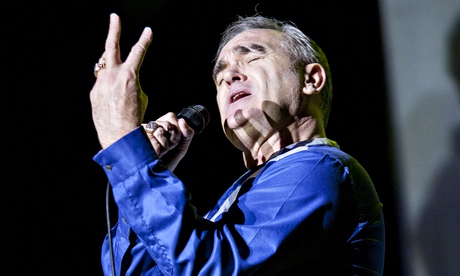
In the interests of fairness, I try to avoid looking at what other people have said about a book I’m reviewing. With List of the Lost, sadly, this was impossible. As soon as it was published last week, the internet erupted with the sound of a thousand contemptuous guffaws. Articles hastily appeared on websites with titles such as “Morrissey’s debut novel: the 10 most embarrassing lines”. Writing in the Guardian, Michael Hann called it an “unpolished turd”. That kind of thing. Unfavourable.
The mirth focused on a sex scene that made reference to a male character’s “bulbous salutation” and a female’s “otherwise central zone”. The book shot to the top of the bookies’ favourites for the Literary Review’s bad sex award. More than that, though, there was a huge sense of disappointment. Crushing the faint hope that the book would be good, it was even worse than feared.
Aside from all this gnashing of teeth, what is the novel actually about? Having slogged through the longest 118 pages, in large-ish font, I can ever remember reading, I am only slightly clearer than I was at the start. There’s a four-man American track relay team: Ezra, Nails, Harri and Justy. They kill someone in the woods. Someone dies. They dig up a body, prepare for a race. And so on, all written in a sludge of assonance and alliteration, like a bad sixth-form James Joyce impersonation. The author’s obsessions keep poking their heads in, like sad parents at a house party.
What haunts this dreadful book, and the coverage it has received, is that between 1983 and 1987 – some would argue into the 90s – Morrissey wrote some of the great British pop lyrics. The Smiths’ songs were plaintive tales of yearning, hymns for young people growing up alienated by Thatcher’s Britain. At their best, his words have a wonderful curt poetry. See There Is a Light That Never Goes Out: “And if a double-decker bus/ crashes into us/ to die by your side, is such a heavenly way to die.” Sad, romantic, unmistakably British. And as with many good pop lyrics, they were really eloquent expressions of adolescence. Simple themes – love, loss – giving force to the jangling guitars.
The book is not without glimpses of the old powers. “There were tears in the eyes of the boy who wouldn’t cry” could be straight out of a Smiths song, and there are perhaps one on every page or two. But they are flashes of quartz in grey paving.
VS Naipaul once wrote that literature is not like music – it is not for the young. Morrissey’s extended adolescence brought him enough success that he will never have to succumb to an editor. You could read any passage of this and it would be identifiable, because only Morrissey – or perhaps Bill Gates – could get away with publishing something this bad. His 2013 memoir, Autobiography, not quite as unreadable but hardly brilliant, was printed immediately as a Penguin Classic. At the time it was seen as a mad indulgence, but perhaps a fitting tribute to the singer’s long career. List of the Lost goes too far.
Morrissey can’t be blamed for believing in his own brilliance. But the spineless mandarins at Penguin who brought this to print should be ashamed of themselves. At a time when the traditional fiction market is under attack from all sides, publishers need to reassure us that their judgment is still valuable. This fiasco of a novel does precisely the opposite.
List of the Lost is published by Penguin (£7.99). Click here to buy it for £5.99

